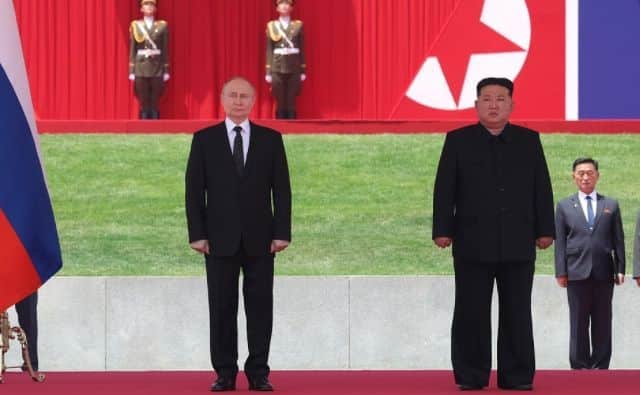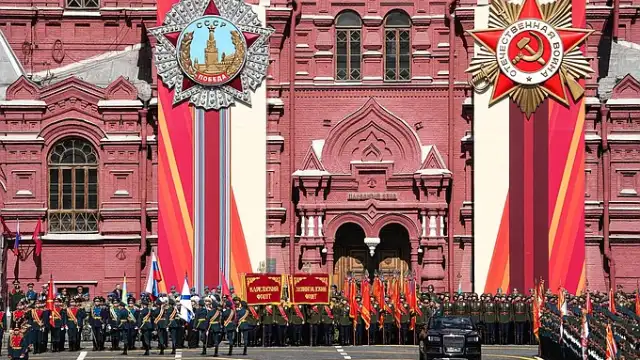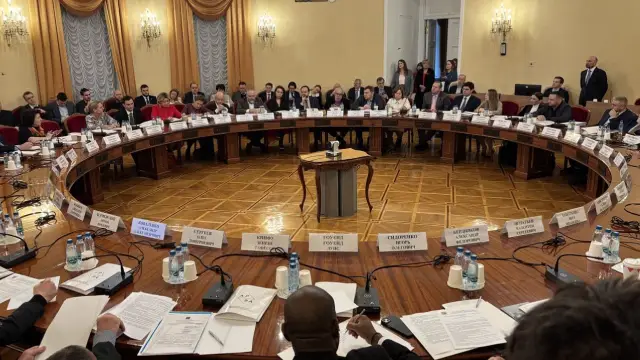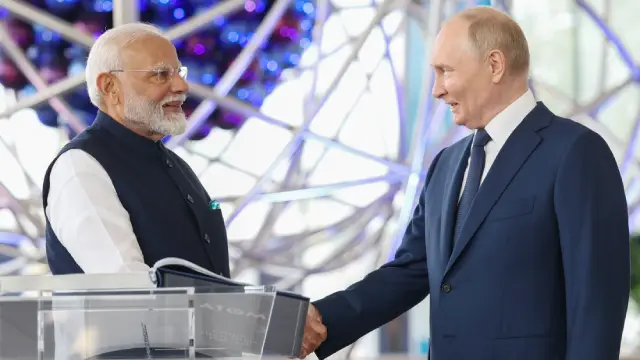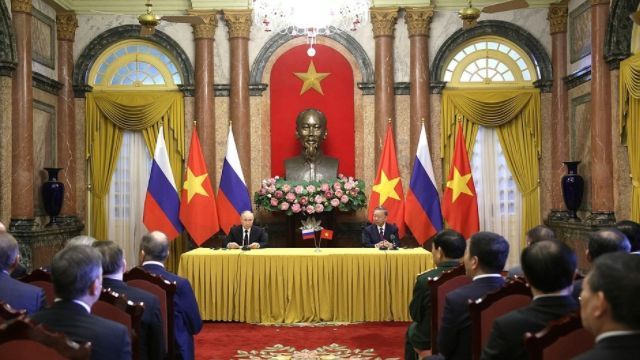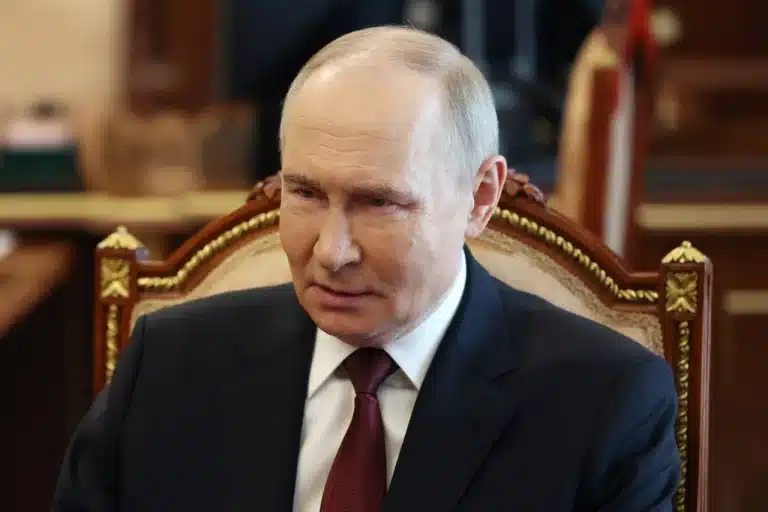Russian President Vladimir Putin’s recent visit to the Democratic People’s Republic of Korea (DPRK or North Korea) on June 18-19 marks a significant moment in the evolving dynamics of North East Asia’s geopolitics. Mr Putin’s DPRK visit and meeting with North Korean leader Kim Jong-un underscored the revival of the enduring ties between the two nations amid pivotal geopolitical shifts.
While the US has managed to keep DPRK as a pariah state in the world for decades and subjected it to stringent sanctions, Russia has been facing the music more loudly since it began its special military operations in Ukraine in February 2022.
The recently held G7 Summit in Italy reaffirmed the West’s commitment to support Ukraine in the war against Russia, which was reiterated during the defence ministers’ meeting of the North Atlantic Treaty Organization (NATO).
In these circumstances, as the US-led western bloc is increasing the burden of sanctions on Russia, Mr Putin’s DPRK visit and his embracing Mr Kim rang a vexing alarm in the West.
To add more to the worries of the West, DPRK and Russia have signed a military pact under which both parties have pledged to support the other in case of military aggression from a third party. This grand move by Russia has the potential to spoil several plots against North Korea, western media reports say.
Mr Putin’s DPRK visit isn’t merely a step to improve bilateral ties. To understand its geopolitical implications one needs to see it using the historical prism that the Russian president used in his article published in the North Korean newspaper Rodong Sinmun.
“Today, as before, Russia and the Democratic People’s Republic of Korea are actively advancing their multifaceted partnership,” he wrote.
Historical context and strategic dimensions
Mr Putin’s DPRK visit, his first in 24 years, underscores Moscow’s efforts to foster a “multipolar world” and strengthen bilateral ties amid fast-changing geopolitical equations.
The Soviet Union first recognised the DPRK and established diplomatic relations in 1949. Soviet leader Joseph V Stalin and DPRK founder Kim Il-sung founded the diplomatic relations between the two states that went through several hiccups over time.
Over the decades, the Soviet Union supported DPRK through economic aid, military support during the Korean War, and assistance in post-war reconstruction.
This historical context forms the backdrop for Mr Putin’s DPRK visit and the signing of the Russia-DPRK Comprehensive Strategic Partnership Agreement.
The Comprehensive Strategic Partnership Agreement
The Russia-DPRK Comprehensive Strategic Partnership Agreement signed during the visit is a cornerstone for renewed cooperation. This treaty includes mutual military assistance in case of an armed attack and extends to economic, technological and political spheres.
This agreement signifies a shift towards a stronger alliance, countering the US-led collective West’s political-economic and military influences and unilateral sanctions.
The Russia-DPRK agreement’s text highlights a commitment to mutual respect for sovereignty, non-interference in internal affairs, and the pursuit of a multipolar international order.
Article 4, for instance, mandates immediate military and other assistance if either party is attacked, a clause reminiscent of Cold War-era pacts.
It’s noteworthy that the DPRK has been supporting Russia’s special military operations in Ukraine and has been reportedly providing Moscow with its much-needed ballistic and munition supplies.
“We highly appreciate the DPRK’s unwavering support for Russia’s special military operation in Ukraine, their solidarity with us on key international matters and willingness to defend our common priorities and views within the United Nations. Pyongyang has always been our committed and like-minded supporter, ready to confront the ambition of the collective West to prevent the emergence of a multipolar world order based on justice, mutual respect for sovereignty and consideration of each other’s interests,” Mr Putin wrote.
The strategic motivations behind Putin’s DPRK visit
Mr Putin’s visit has been interpreted by US officials as a bid to secure artillery and ammunition for Russia’s war in Ukraine, pointing to Moscow’s depleted military stocks and sanctions-hampered production capacities.
This move recalls the Soviet Union’s historical provision of weapons to DPRK during the Korean War.
The West sees a cyclical return to military cooperation amid current conflicts.
However, Russia has been emphasising strengthening its ties with its traditional allies at a crucial juncture when multipolarity is gaining currency in the global geopolitical landscape.
Highlighting this, Mr Kim stated that “the treaty will become a driving force for the multipolar world”, underscoring a strategic alignment against the West’s hegemonic quest and military endeavours in the Korean peninsula.
“This comprehensive agreement between the two countries, the DPRK and the Russian Federation, is nothing less than a document of a very constructive, future-oriented, exclusively peace-loving and defensive nature, designed to protect and defend the basic interests of the two nations. I have no doubt that it will become a driving force accelerating the creation of a new multipolar world, free from domination, enslavement, hegemony, and violence,” Mr Kim said.
This sentiment is echoed in Mr Putin’s commentary on the US and NATO’s supply of high-precision weapons systems and aircraft to Ukraine, which he condemns as a violation of international obligations.
“Our adversaries, meanwhile, continue to supply the neo‑Nazi Kiev regime with money, weapons and intelligence information, allow – and, effectively, encourage – the use of modern Western weapons and equipment to deliver strikes on the Russian territory, aiming at obviously civilian targets in most cases,” Mr Putin claimed in his article.
“Both Russia and Korea conduct an independent and autonomous foreign policy and do not accept the language of blackmail and dictate. We are against the practice of applying politically motivated sanctions and restrictions. These illegitimate actions can only shatter the world political and economic system,” Mr Putin said in a joint press statement with Mr Kim.
Economic and technological cooperation
Beyond military aspects, the DPRK-Russia treaty fosters economic independence from the American dollar, promoting local currency use. It also opens avenues for advanced technical and military cooperation, touching on sectors like education, healthcare, tourism, and foreign investment. Article 10 of the agreement emphasises efforts to boost mutual trade, economic cooperation, and protection of investments, reflecting a broadening of bilateral engagement.
Highlighting the growing trade between the countries, despite the heavy US sanctions, Mr Putin said, “As for trade, the absolute figures are still small, but we observe very good dynamics. In 2023, trade increased ninefold. Over the first five months of this year, it grew by another 54%”.
“The Intergovernmental Commission is working well on a variety of areas of our cooperation. Let me mention the strategically important project to upgrade the Khasan-Rajin railway with the participation of our company, Russian Railways,” the Russian president highlighted.
“Renovation is underway of the combined 1435/1520 mm gauge from the Khasan checkpoint in Russia to the Korean port of Rajin, where an up-to-date multimodal trans-loading terminal has been built. All this is used, among other things, in the interests of third countries; in particular, a large batch of coal has been supplied to Chinese consumers. Passenger rail traffic between our countries has been restored. The first tourists have already used it,” Mr Putin added.
Strategic DPRK-Russia cooperation and future outlook
The DPRK-Russia agreement also covers critical areas such as food and energy security, ICT security, climate change, healthcare and supply chains (Article 9).
This approach indicates a strategic blueprint for comprehensive collaboration, enhancing both countries’ resilience against challenges posed by the West.
The agreement’s Article 10 entails that DPRK and Russia will expand cooperation in trade, economic, investment, scientific, and technical fields.
Both will work to increase mutual trade, create favourable conditions for economic cooperation in customs, monetary, and financial areas, and protect investments per the 1996 agreement.
Most interestingly, Mr Kim’s government has hinted at a move towards a reformed economic system.
Article 10 of the agreement also highlights this by stating that support will be provided to special/free economic zones and involved organisations in both countries.
Additionally, they will encourage joint research in science and technology, covering fields such as space, biology, peaceful nuclear energy, artificial intelligence and information technology.
Such collaborations can further infuriate and frustrate the West, which has been crusading for a long period to prevent these countries from acquiring high-level, sophisticated technology.
Where does the way go?
Mr Putin’s DPRK visit and the signing of the Comprehensive Strategic Partnership Agreement symbolise a strategic pivot for both countries that have a historic tie.
The treaty’s provisions for mutual military support, economic cooperation and technological advancement mark a significant paradigm shift in regional geopolitics.
With the treaty in force, it will be difficult for the US and its regional allies like South Korea and Japan to provoke North Korea and start any military conflict. One can recall how the US was anxious in the 1950s regarding direct Soviet participation in the Korean War.
As both nations navigate the treacherous waters of geopolitical challenges, this partnership aims to shape a future grounded in mutual support and strategic collaboration, challenging the existing unipolar world order and the West’s hegemony.
In Putin’s words, “Russia has always been and will remain open to equal dialogue on all issues, including the most difficult ones.” Thus, Mr Putin’s DPRK visit and the resultant treaty are clear indicators that Russia and DPRK are positioning themselves as key builders of a multipolar world at present.
Join our channels on Telegram and WhatsApp to receive geopolitical updates, videos and more.

